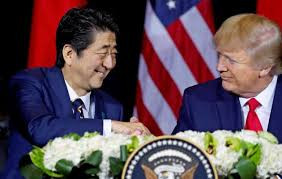A limited trade deal, its first phase at least, between US and Japan got signed cutting down tariffs on Japanese machine tools and the country's other products and US farm goods while putting on hold the higher car tariffs that the US might still impose.
While Japan will be on the receiving end of $7 billion worth of US products, the tariffs on American beef, cheese, pork and wheat would get slashed and some of them would totally get removed.
US President Donald Trump also said that the two country's first phase of the deal would include $40 billion of digital trade between the world's largest and third-largest economies.
Though there's no signed agreement yet covering auto trade, Japan's Prime Minister Shinzo Abe said that US President Donald Trump "firmly confirmed" that there wouldn't be any national security tariffs on Japan's car imports while there is a trade deal getting implemented.
The prime minister said that with the trade agreement, he believes that both economies "will be able to further grow and develop."
US Trade Representative (USTR) Robert Lighthizer said that Japan and US would talk about cars in the next round of trade talks about to happen in April 2020.
The biggest source of the $67 billion US trade deal involves automotives.
Trump had made it known that American automakers do not enjoy equal access to the Japanese market though Lighthizer said it was not the intention of the US to impose additional car tariffs.
The car tariff decision got based on the results of a Commerce Department study that has found auto imports to threaten national security.
Japanese Foreign Minister Toshimitsu Motegi, who negotiated the agreement with Lighthizer, stressed that as long as the agreement is faithfully implemented, the tariffs would not get applied.
Lighthizer, on a previous job at USTR in the 1980s, helped increase US car production by Japanese automakers.
However, Japan still exports about 1.7 million cars a year to the United States, making up about 10% of vehicle sales in America.
The Japanese government issued a statement that said further negotiations would be made to remove the 2.5% US tariff on Japanese cars.
With the coverage of the first phase of the deal getting signed, there's now certainty that there will be fewer hurdles to digital trade, no threats to American jobs or raised prices, according to US Representative Jackie Walorski, an Indiana Republican.
The USTR said this "early achievement" signed by Trump and Abe involving market access for agriculture, digital trade and industrial goods will give some limited relief to US farmers who had been affected by the US-China trade concerns.
China's last US agricultural purchases is taken by Trump as a sign of "goodwill" making him state that an agreement with China will come sooner than many think.






